November 29, 2006
Slow reading
I remember reading an article about the joy of slow reading in an old edition of Readers’ Digest. The writer was at a place where books were hard to come by.
So every book that he could lay his hands on he would read everything in it, even things like acknowledgements and printing history. He would read the story slowly. He would pause to ponder over the meaning of a word or linger over a passage savouring the emotions it had evoked in him.
I have tried it but could not sustain for long. It needs patience, discipline and a conducive environment.
I have seen tourists sitting on deck-chairs and reading books at the beach in Koh Samui (a beach resort in Thailand). I can’t do that. I would rather enjoy the sea breezes, the sounds of the waves and the sights.
Anyway, when I read a story book, I don’t rush through. And if I read an article whether in magazines or blogs I don’t just skim through; I try to read every word. Habit.
November 26, 2006
Crowded trains
Last week a report in the papers said Singaporeans complained about our trains too crowded. People interviewed said the situation was much worse in New York and Tokyo.
I have not been to New York; I have been to Tokyo but did not take the trains. But I can say that in Hong Kong the trains (they call them MTR) are always crowded most of the day and during peak hours it is terrible.
You would be amazed by the massive waves of humanity at the train stations during peak hours. When you arrive at the platform, there would already be hordes of people in front of you. You wonder where they come from. You won't be able to board the first train that arrives. Most likely you could only board the third train.Forget about getting a seat, you would be standing all the way and sometimes with people squeezing you from behind, left and right.
So, comparatively our trains are not that crowded. And relative to the fares we pay, I think the service is also not bad.
November 25, 2006
November 24, 2006
Opera Shows
Yue Opera
Two operas by the Shanghai Yue Opera House at the Esplanade Theatre:
22 Dec 06 - Dream of the Red Chamber
23 Dec 06 - The Meilong Inn
Tickets: SISTIC
Details: http://www.tang-renaissance.com/


22 Dec 06 - Dream of the Red Chamber
23 Dec 06 - The Meilong Inn
Tickets: SISTIC
Details: http://www.tang-renaissance.com/


November 21, 2006
Minimum wage
I was wondering how a minimum wage would affect the job market.
I have not read any economic theory by any professor. Just a layman’s view:
Workers get more pay. Good for the worker and his family.
Will this result in better morale among workers, increased productivity, lower rate of job turnover, higher service standard, attracting higher-quality workers. Not necessary. I think all these are debatable.
For employers, they might hire fewer workers. Workers will find it more difficulty to get jobs, especially the lower-skilled workers. Then, since it is the same wage, some employers might replace their existing workers with better-qualified ones. Some workers might lose their jobs. I think all these are quite possible. No?
I don't know whether it will affect foreign companies intending to set up shops or how it will affect small businesses.
November 20, 2006
Opera in the earlier years
This post is partly due to Victor's remarks on his observation of street opera in his neighbourhood. The picture below of a street opera is in much earlier time - I think before the 50s.









a street opera show in the early days

hahaha...these people watching from under the stage

amateur opera groups

clan opera groups




November 19, 2006
Street Opera
This cantonese street opera at Chinatown is into its 11th day today (Saturday, 18 Nov) with 3 more days to go. So far I have watched only one night show. For a street opera, the ticket prices are expensive, from $4 to $25. There is only one row of $4 seats – the last row. I heard that the male lead from HK is also very expensive; someone told me $1500 per day and he only performs the night shows during weekdays.
The enclosure is very very warm and humid even though the three sides are open and the fans are working full speed. One good thing is the floor plan – from the row nearest the stage the floor slopes upwards so that everyone gets a clear view of the stage.
At one end of the field is the opera show and at the other end the religious rites of the ‘San Wang Wu Ti’ sect are carried out.
In the past years there was also a Hokkien opera (for 3 or 4 days) going on during the same period in an adjacent field in conjunction with the religious celebrations of another Taoist sect. The juxtaposition of these different operas in the same area and together with the fervent religious activities going on presents a unique Singapore Experience.
But this year there is only one vacant field. I don’t know where the Hokkien opera has been moved to.
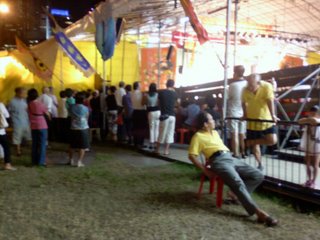
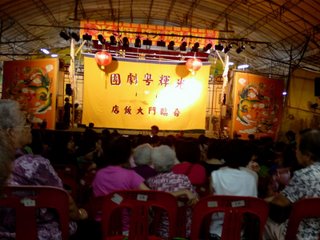

Saturday afternoon I went down to have a look. It was extremely hot. But there were quite a lot of opera-crazed people outside and inside the enclosure enduring the oppressive heat to watch the opera.

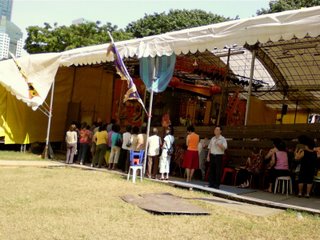
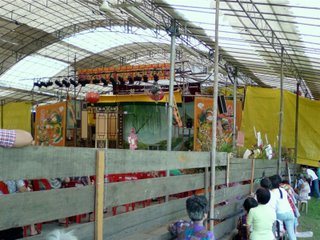
The enclosure is very very warm and humid even though the three sides are open and the fans are working full speed. One good thing is the floor plan – from the row nearest the stage the floor slopes upwards so that everyone gets a clear view of the stage.
At one end of the field is the opera show and at the other end the religious rites of the ‘San Wang Wu Ti’ sect are carried out.
In the past years there was also a Hokkien opera (for 3 or 4 days) going on during the same period in an adjacent field in conjunction with the religious celebrations of another Taoist sect. The juxtaposition of these different operas in the same area and together with the fervent religious activities going on presents a unique Singapore Experience.
But this year there is only one vacant field. I don’t know where the Hokkien opera has been moved to.



Saturday afternoon I went down to have a look. It was extremely hot. But there were quite a lot of opera-crazed people outside and inside the enclosure enduring the oppressive heat to watch the opera.



November 12, 2006
Photo-taking
A short clip of the artistes getting ready for the photo-taking after their performance. (See the post below)
鴛鴦淚灑莫愁湖
Cantonese opera show
on 11-11-2006 at Kreta Ayer People’s Theatre
organized by Kolam Ayer CC Chinese Cultural Group
lead artistes: Ng Lily, Chik Chiew Kuarn (黃莉莉, 戚超群)
guest artiste: Fung Kong Ngai (馮剛毅)
This opera has high entertainment value which is an important factor in opera shows. But there is one part which is rather unconvincing. In scene 6, the scheming wife told the physician to add an item to his prescription for her sick husband. She claimed she had some medical knowledge and threatened to get the physician arrested for being incompetent if he did not do so. How could an experienced an upright physician gave in to such flimsy threat…
Lily Ng was the leading xiao sheng for the first six scenes. Guest artiste Fung Kong Ngai from China took the last scene. She gave a spirited performance in scenes 3 and 5. On the whole she did creditably.
True to his reputation, in the final scene Fung gave a stirring rendering of the theme song to an attentive audience.
Chik Chiew Kuarn was the leading hua dan. She has the physique of a dan. She also has a pleasing appearance. I feel her look and the way she recites some lines bear a slight resemblance to Leong Seok Heng, a hua dan in China. But I think she sings better than Leong. She sang the theme song in scene 5 very well.
Others in the main cast were the scheming wife, the unethical tai jun and the conceited maid. They too performed well.
All these are just my personal non-professional view
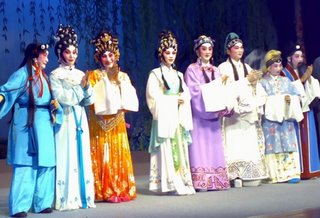
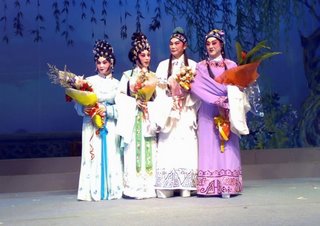
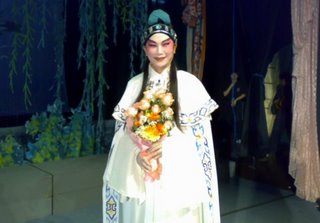
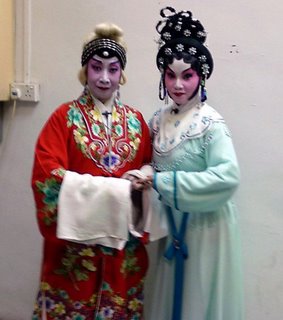

on 11-11-2006 at Kreta Ayer People’s Theatre
organized by Kolam Ayer CC Chinese Cultural Group
lead artistes: Ng Lily, Chik Chiew Kuarn (黃莉莉, 戚超群)
guest artiste: Fung Kong Ngai (馮剛毅)
This opera has high entertainment value which is an important factor in opera shows. But there is one part which is rather unconvincing. In scene 6, the scheming wife told the physician to add an item to his prescription for her sick husband. She claimed she had some medical knowledge and threatened to get the physician arrested for being incompetent if he did not do so. How could an experienced an upright physician gave in to such flimsy threat…
Lily Ng was the leading xiao sheng for the first six scenes. Guest artiste Fung Kong Ngai from China took the last scene. She gave a spirited performance in scenes 3 and 5. On the whole she did creditably.
True to his reputation, in the final scene Fung gave a stirring rendering of the theme song to an attentive audience.
Chik Chiew Kuarn was the leading hua dan. She has the physique of a dan. She also has a pleasing appearance. I feel her look and the way she recites some lines bear a slight resemblance to Leong Seok Heng, a hua dan in China. But I think she sings better than Leong. She sang the theme song in scene 5 very well.
Others in the main cast were the scheming wife, the unethical tai jun and the conceited maid. They too performed well.
All these are just my personal non-professional view

鐘麗蓉, 戚超群, 馮剛毅, 黃莉莉

guest artiste 馮剛毅

tai jun & the maid 陳惠嬋, 鐘麗蓉

the wife 譚彩雲

November 08, 2006
Old pictures
My friend Victor mentioned in jest that MM Lee was an opera fan. It made me think of something and I went to check up an opera book. Sure enough, I found this photo of the then PM Lee and MP for Tanjong Pagar presenting an award to an opera artiste during a show to raise funds for the Tanjong Pagar Community Centre. It was in1972, 34 years ago.

And it says opera artistes from Hong Kong were popular then. The names of these artistes were not stated. They look a little familiar but I am not sure who they are. Anyone knows?

Going to the movies was a common form of entertainment for many people in the 60s. Some popular movies were shown to full-houses for weeks. The picture below shows a billboard on wheels advertising a mandarin movie and three other advertisements - one for a cantonese movie, one for a hokkien movie and one for a teochew movie. (Click on picture for larger version)


And it says opera artistes from Hong Kong were popular then. The names of these artistes were not stated. They look a little familiar but I am not sure who they are. Anyone knows?

Going to the movies was a common form of entertainment for many people in the 60s. Some popular movies were shown to full-houses for weeks. The picture below shows a billboard on wheels advertising a mandarin movie and three other advertisements - one for a cantonese movie, one for a hokkien movie and one for a teochew movie. (Click on picture for larger version)

Subscribe to:
Comments (Atom)




